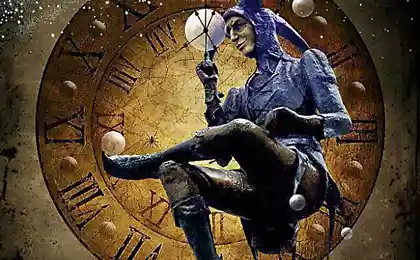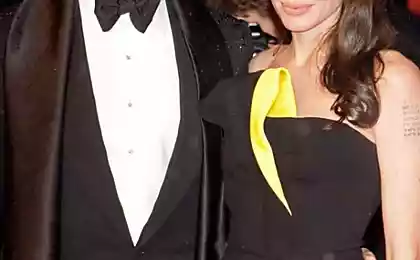733
The difference between the past, present and future - just an illusion sustained
Author of the concept biocentric universe, professor at the Institute for Regenerative Medicine Robert Lanza and astronomer Bob Berman explained that the boundaries of our existence - an illusion, because in a world where time and space - just tools, organizing the flow of information, the question of "whether the death exists" does not make sense .
Here we will tell you what happens after you die. Jokes aside. Well, it's not so serious, because you do not really die.

First, let's summarize the scientific understanding of death: in fact, you die, and that's the end of everything. This opinion is popular among intellectuals, who are proud of the fact that quite firmly and realistically look at things and avoid the cowardly refuge in the spiritual "opium" of Karl Marx - the belief in the afterlife. This modern view is not the most fun.
But in our theory of the universe, which is called biocentrism and that life and consciousness creates reality around them, there is no place for death itself. To fully understand this, we must go back to Albert Einstein's theory of relativity, one of the foundations of modern physics. Einstein's conclusion that the past, present and future are not absolute values, destroys the idea of the immutability of time. As noted physicist Julian Barbour:
"If you try to take the time to hand, it is always flowing out through your fingers. People believe that the time is there, but can not access it. I think they can not get access to it, because it do not exist. »
He and many other physicists consider every single moment as a single, complete and current itself. We live in the sequence of these moments, which Barbour calls "NOW» (nows).
"I have a strong feeling that things have a certain position in relation to each other. I'm trying to disengage from all that we can not see (directly or indirectly), and just keep the idea of coexistence of many things at the same time. It's just "now." - Neither more nor less »
In fact, Einstein's colleague, John Wheeler (who popularized the word "black hole") also suggested that the time is not a fundamental aspect of reality. In 2007, his experiment with the "delayed choice" showed that you could retroactively affect the past, changing the particle of light called a photon, in the present tense.
When light passes through a gap in the experimental setup, he must decide to behave like a particle or like a wave. In the future (after the light has passed through the gap) scientist can turn off or turn on the switch. The fact that the scientist does in this moment, in hindsight determines how particles behave at the moment it passes through the slit.
These and other experiments have shown that an illusion over time. But how can we feel the world in which there is no time? And what does this tell us about death?
Biocentrism sheds some light on these questions. Werner Heisenberg, the Nobel Prize in Physics and a founder of quantum mechanics, once said:
"Modern science today more than ever before, thanks to the very nature has been compelled again to raise the question of the possibility of understanding the reality of mental processes».
It turns out that everything we see and experience, - a whirlpool of information raging in our heads. We are not only the objects that are included in certain external matrix ticking "in there somewhere." Rather, space and time are the tools that our mind uses to connect them together.
Of course, while you're reading this, you are experiencing the "now". But keep in mind: from the point of view of your grandparents, your "now" exist in its future, and the "now" her grandmother there in her past. The words "past" and "future" are just ideas, relative to each observer.
So what happened to your great-grandmother after she died? To begin with - because time does not exist, can not be "after death", except for the death of her physical body in your present. As all - it's just "now" may not be the absolute matrix of space / time to dissipate its energy - it is simply impossible to "go" somewhere else
. Think of it as one of those old phonographs. Information recording is converted into three-dimensional reality that we can feel at some point. Any other information recording exists only as a potential.
Any causal history, leading to the experience of "now" can be considered as "past" (ie songs that played before, wherever there was a needle), as well as any events that followed in the "future"; these parallel "now" called superposition. Similarly, the state before death, including the current life with her memories back in a superposition - in the part of the recording, which only provides information
. In short, the death does not actually exist. Instead, the moment of death we reach the imaginary border itself, the boundary of the forest, where, as in the old tale of the fox and the hare say goodnight to each other.
And if death and time - the illusion, they are also continuously in the "now" connection. Where then do we find? On the steps that can be mixed and reshuffled in any place, as those "where Hermes won the dice at the moon, that Osiris is born", as Ralph Waldo Emerson said in 1842.
Einstein was known. In 1955, when one of his close friend Michele Besso died, he wrote:
"Now he has left this strange world a little ahead of me. This means nothing. People like us, who believe in physics, know that the distinction between past, present and future - just an illusion sustained. "
Here we will tell you what happens after you die. Jokes aside. Well, it's not so serious, because you do not really die.

First, let's summarize the scientific understanding of death: in fact, you die, and that's the end of everything. This opinion is popular among intellectuals, who are proud of the fact that quite firmly and realistically look at things and avoid the cowardly refuge in the spiritual "opium" of Karl Marx - the belief in the afterlife. This modern view is not the most fun.
But in our theory of the universe, which is called biocentrism and that life and consciousness creates reality around them, there is no place for death itself. To fully understand this, we must go back to Albert Einstein's theory of relativity, one of the foundations of modern physics. Einstein's conclusion that the past, present and future are not absolute values, destroys the idea of the immutability of time. As noted physicist Julian Barbour:
"If you try to take the time to hand, it is always flowing out through your fingers. People believe that the time is there, but can not access it. I think they can not get access to it, because it do not exist. »
He and many other physicists consider every single moment as a single, complete and current itself. We live in the sequence of these moments, which Barbour calls "NOW» (nows).
"I have a strong feeling that things have a certain position in relation to each other. I'm trying to disengage from all that we can not see (directly or indirectly), and just keep the idea of coexistence of many things at the same time. It's just "now." - Neither more nor less »
In fact, Einstein's colleague, John Wheeler (who popularized the word "black hole") also suggested that the time is not a fundamental aspect of reality. In 2007, his experiment with the "delayed choice" showed that you could retroactively affect the past, changing the particle of light called a photon, in the present tense.
When light passes through a gap in the experimental setup, he must decide to behave like a particle or like a wave. In the future (after the light has passed through the gap) scientist can turn off or turn on the switch. The fact that the scientist does in this moment, in hindsight determines how particles behave at the moment it passes through the slit.
These and other experiments have shown that an illusion over time. But how can we feel the world in which there is no time? And what does this tell us about death?
Biocentrism sheds some light on these questions. Werner Heisenberg, the Nobel Prize in Physics and a founder of quantum mechanics, once said:
"Modern science today more than ever before, thanks to the very nature has been compelled again to raise the question of the possibility of understanding the reality of mental processes».
It turns out that everything we see and experience, - a whirlpool of information raging in our heads. We are not only the objects that are included in certain external matrix ticking "in there somewhere." Rather, space and time are the tools that our mind uses to connect them together.
Of course, while you're reading this, you are experiencing the "now". But keep in mind: from the point of view of your grandparents, your "now" exist in its future, and the "now" her grandmother there in her past. The words "past" and "future" are just ideas, relative to each observer.
So what happened to your great-grandmother after she died? To begin with - because time does not exist, can not be "after death", except for the death of her physical body in your present. As all - it's just "now" may not be the absolute matrix of space / time to dissipate its energy - it is simply impossible to "go" somewhere else
. Think of it as one of those old phonographs. Information recording is converted into three-dimensional reality that we can feel at some point. Any other information recording exists only as a potential.
Any causal history, leading to the experience of "now" can be considered as "past" (ie songs that played before, wherever there was a needle), as well as any events that followed in the "future"; these parallel "now" called superposition. Similarly, the state before death, including the current life with her memories back in a superposition - in the part of the recording, which only provides information
. In short, the death does not actually exist. Instead, the moment of death we reach the imaginary border itself, the boundary of the forest, where, as in the old tale of the fox and the hare say goodnight to each other.
And if death and time - the illusion, they are also continuously in the "now" connection. Where then do we find? On the steps that can be mixed and reshuffled in any place, as those "where Hermes won the dice at the moon, that Osiris is born", as Ralph Waldo Emerson said in 1842.
Einstein was known. In 1955, when one of his close friend Michele Besso died, he wrote:
"Now he has left this strange world a little ahead of me. This means nothing. People like us, who believe in physics, know that the distinction between past, present and future - just an illusion sustained. "























